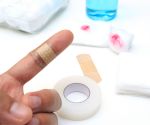Advertisement
In a closed wound, the skin’s surface is not broken; therefore, tissue damage and any bleeding occur below the surface. The simplest closed wound is a bruise. A bruise develops when the body is bumped or hit, such as when you bump your leg on a table or chair.
The force of the blow to the body damages the soft-tissue layers beneath the skin. This causes internal bleeding. Blood and other fluids seep into the surrounding tissues, causing the area to swell and change color.
A more serious closed wound can be caused by a violent force hitting the body. This type of force can injure larger blood vessels and deeper layers of muscle tissue, which may result in heavy bleeding beneath the skin and damage to internal organs.
The force of the blow to the body damages the soft-tissue layers beneath the skin. This causes internal bleeding. Blood and other fluids seep into the surrounding tissues, causing the area to swell and change color.
A more serious closed wound can be caused by a violent force hitting the body. This type of force can injure larger blood vessels and deeper layers of muscle tissue, which may result in heavy bleeding beneath the skin and damage to internal organs.

Continue Learning about Injuries, Wound and Trauma
Important: This content reflects information from various individuals and organizations and may offer alternative or opposing points of view. It should not be used for medical advice, diagnosis or treatment. As always, you should consult with your healthcare provider about your specific health needs.






